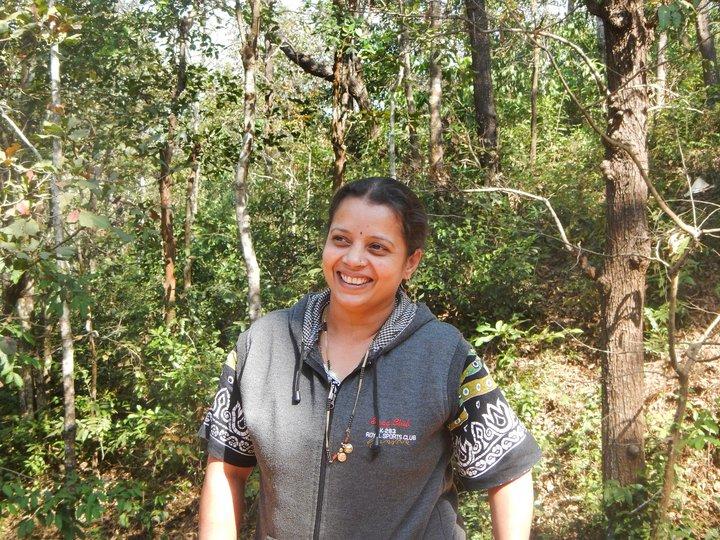Success through unity: a women’s collective uses the potential of forest products

On the occasion of International Women’s Day, Bioversity International scientists Marlène Elias and Riina Jalonen and researcher Narasimha Hegde from LIFE Trust, interviewed Ms Nagaveni Hegde, leader of the recently formed Matrabhoomi Women’s Group.
On the occasion of International Women’s Day, Bioversity International scientists Marlène Elias and Riina Jalonen and researcher Narasimha Hegde from LIFE Trust, an NGO based in Sirsi, India, interviewed Ms Nagaveni Hegde, leader of the recently formed Matrabhoomi Women’s Group, to learn about her experiences leading an association of collectors and processors of non-timber forest product (NTFP). A charismatic and dedicated leader, Nagaweni celebrates one year of the group’s formation and shares her experiences leading the group.
Q: Can you please tell us how your group was formed and how it has evolved?
Nagaweni: The idea to form an association to process non-timber forest products (NTFPs) came from the work done last year [through LIFE Trust and Bioversity International, in the context of the Gender Research Fellowship Programme], which started in 2013.
Women from different backgrounds [ethnic communities] came together, gained knowledge through group discussions and got inputs from the facilitators. We [women] wanted to start processing and marketing forest products to earn some income. During the discussions, we gained skills for making a sweet kokum (Garcinia indica) concentrate. We used to make it only for our own consumption by boiling the fruit rind but we learned to sun-dry the fruit and add sugar to make it tastier for consumers. We also learned about packaging and labelling when we went to the market with the researchers to see how other similar products were being sold.
Q: Can you tell us more about your group’s activities and what you hope to achieve this year, and as you move forward?
Nagaweni: Our group is comprised of ten women. Last year [2014] was the first year we sold kokum juice. We sold 350 liters of it and ran out of stock since there was a lot of interest in our product. We also sold many other forest products, like jackfruit processed into chips and papadams, spice mixtures, and mango slices. We made seven products in total, in small quantities. These products could be processed at different times of the year, when the specific forest product is in season.
Our group members are paid 200 Rupees (approx. 3.2 US$) for every day they work to process these products, and any profit left over is shared equally among members.
In 2015, we want to increase our production of kokum. By looking at the kokum flowers and the small fruit that are already present on the tree, we can tell that kokum yields may be a bit low this year so that will make production harder for us. Still, we will work hard to produce more than we did last year.
Q: What are some of the biggest challenges you faced in your association and how did you overcome them?
Nagaweni: We faced and still face a number of challenges. First, we had a shortage of labour. Women from the village are very busy with many activities and could not process large quantities of our products; but we realized that by working together we could overcome some of these shortages and produce more. At the end of the day, though, it remains my responsibility to make sure that the product [NTFP] is processed when it is brought to our home [the group’s de facto headquarters] before it spoils. When women have to go home and their forest products are left at our place, I personally have to work hard to process them in good time.
Another major hurdle is the distance between the houses here. As you can see, our village landscape is very hilly, the houses are scattered and women move around and headload their goods on footpaths. Some have had to come from many kilometers away to process their products. We have poor communication lines and access to roads and we can’t work late in the evenings since we have to get home to prepare dinner and tend to our households and families and should not walk home alone in the dark.
We also face problems obtaining financing. Since our association is not yet officially registered, we have to advance money ourselves to finance our activities by individually taking loans from the [farmer] cooperative society. I have provided most of the advance required for our activities this way.
Q: What advice would you give to other women who want to undertake a similar endeavor?
Nagaweni: I support other women who want to form a group like this one. My main piece of advice is that unity is important in the group, otherwise the group will not survive. We should not forget that. Unity is strengthened when a clear message is shared that through the group we can achieve more than on our own. There should also be incentives through selling different products—an assured cash income—to keep the interest of group members.
The Matrabhoomi Women’s Group was formed in 2013 with the support of Bioversity International and LIFE Trust. In 2015 and for the next three years, Matrabhoomi, LIFE Trust and Bioversity International will continue to collaborate to enhance forest-based livelihoods, promote women’s empowerment and study and conserve the unique biodiversity found in the tropical forests surrounding Sirsi, in India’s Western Ghats.
Bioversity International’s forest research contributes to the CGIAR Research Program on Forests, Trees and Agroforestry.
